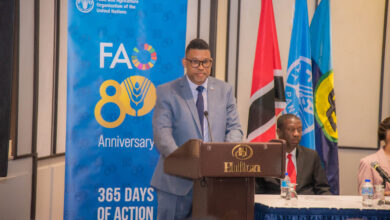CARICOM Deputy Secretary-General, Dr. Armstrong Alexis, on Monday, 20 November 2023, made remarks at the opening of the Third Regional Workshop on the CARICOM Core Sustainable Development Goals (SDGs) Indicators in Trinidad And Tobago.
Please read his remarks below:
Representatives from CARICOM Member States, Associate Members, Partners, Staff of the Central Statistical Office, Trinidad and Tobago, Ladies and Gentlemen.
It is with great pleasure that I address you briefly this morning. Thank you for the opportunity to share some thoughts as we gather to discuss matters pertinent to the sustainable development of the Caribbean. As I commence my brief remarks, I am cognisant of your contribution in determining the region’s core SDG indicators. I therefore commend you for your steadfast contribution towards the region’s attempt to ensuring the availability of measurable data necessary to determine progress towards the achievement of the 2030 development agenda.
My deepest appreciation goes out to the Central Statistical Office of Trinidad and Tobago and by extension the Government of the Republic of Trinidad and Tobago for hosting this training workshop at your facility. Thank you for all of the logistical and administrative arrangements that will ensure our comfort as we embark on the discussions of the coming days.
It is also opportune, for me to acknowledge in a special way, the support of the European Union, through the Eleventh European Development Fund (11th EDF, Strengthening the Framework for CARICOM Integration and Cooperation Process Programme (SFCICPP) who has provided funds to support this workshop. I reassure you of CARICOM’s appreciation for and commitment to improving global partnerships as we design and undertake interventions aimed at securing a viable, sustainable and prosperous Community for all our citizens.
It is worth recalling that in September 2015, the 2030 Agenda for Sustainable Development (2030 Agenda) was agreed to by Heads of Government including those of the Caribbean Community (CARICOM) at the United Nations Sustainable Development Summit. The 17 Sustainable Development Goals (SDGs), 169 Targets and 231 unique indicators have become the means through which we monitor, measure and report on sustainable development worldwide. For our region, we have identified 125 unique CARICOM Core SDG indicators that we will focus on and ensure data is available for tracking Caribbean progress using the 2030 framework.
We are now at the halfway stage of the 2030 Development Agenda and the UN Secretary General has reminded us that the world is not on track to achieve the SDGs. The recent SDG Summit held in September under the auspices of the UN General Assembly has informed the world that at the midpoint of Agenda 2030, the SDGs are in jeopardy as progress stalls amid the climate crisis, economic fluctuations, conflicts and pandemic aftermath. In our own region, we have faced unanticipated setbacks. Our plans to undertake household surveys and other data-gathering interventions have not materialised and we have faced significant delays in the conduct of the 2020 round of censuses, and whilst it is recognised that availability of data must be juxtaposed against meaningful interventions to ensure no one is left behind, we must emphasise the importance of verifiable data to gauge how well we are doing as we progress towards 2023.
Many of our Member States have submitted Voluntary National Reports and through this mechanism, gaps have been identified and progress reported. As statisticians, your role is to ensure the availability of the data that informs reporting on progress and in undertaking this responsibility, you can be assured of the support of the CARICOM Secretariat. Our Regional Statistics Programme has been a critical cornerstone of the regional effort and their undertakings have been pivotal in our ability as a Secretariat to update Member States and receive approvals through the Council of Human and Social Development. We will continue to provide this support for it is critical that that commitment made in 2015 for a better future for people and planet, continues to be our goal.
I note the plan to undertake a second assessment to determine the kind of support Member States will need to produce the agreed-upon data related to the Core SDG Indicators approved by the COHSOD in 2018. Despite the immense challenges that we have faced, one thing is certain and that is we cannot relent and it is incumbent upon us to periodically review where we are and what else needs to be done to ensure continued progress. In the words of Amena Mohammed, the Deputy Secretary General of the United Nations, “failing is not an option. There is just too much at stake.”
Let us therefore use this opportunity of the next few days to take stock and recommit ourselves to the actions necessary to ensure the achievement of the 2030 Development Agenda. Yours is a critical role and I commend you for taking time out to focus on the efforts necessary to move this agenda forward. I look forward to the discussions and the lessons that will be shared. These four days will provide us with an opportunity to focus on some key transitions that this region has committed to.
As we delve into the business end of this Workshop, I invite you to engage in open and collaborative discussions, drawing upon our collective expertise to address the challenges and to seize the opportunities that lie ahead. I am therefore confident that the outcomes will contribute significantly to the advancement of sustainable development in the CARICOM region.
I now look forward to the valuable insights and recommendations that will arise from our discussions this week.
Thank you.






